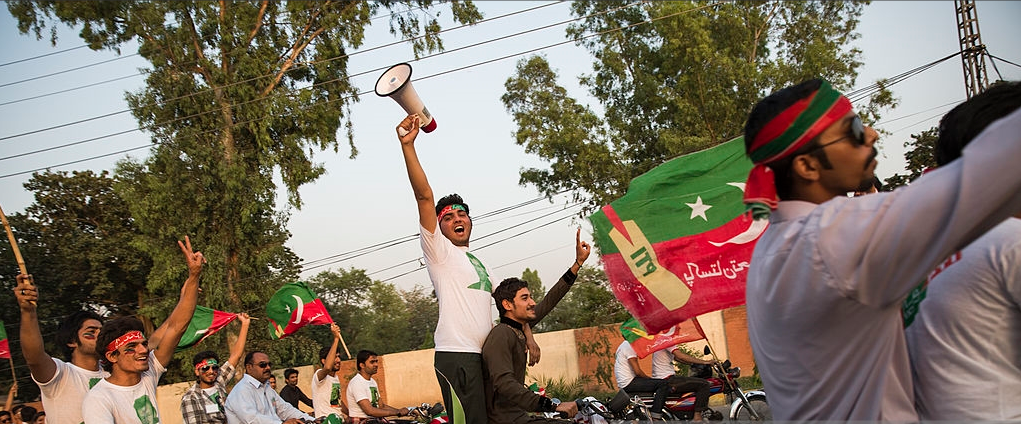
Voices this Week draws together published material on an important strategic issue in South Asia. This week: the Azadi March and the history of political opposition in Pakistan.
Mariam Mufti offers an account of the historical role of the opposition in Pakistan. She highlights a number of important trends, examining five periods since 1970, “the Bhutto years,” 1970-77; “the Zia interlude,” 1977-88; “the democratic interregnum,” 1988-99; “the Musharraf era,” 1999-2008; and “the transition to democracy,” 2008-present. Mufti contends that:
“Opposition parties have hindered democracy in Pakistan by engaging in adversarial politics, instead of offering a credible alternative and holding the ruling party accountable….
“The lack of issue-based politics coupled with the inability of the ruling parties to accept the rightful role of the opposition in parliament has inhibited the development of mature and responsible opposition forces in Pakistan.”
Daniel Markey outlines “Why Street Protests Work in Pakistan.” He says that part of Sharif’s current vulnerability to popular protest stems from “his own policy missteps that have dissipated enthusiasm for his rule,” such as “his dealings with the army [rife with tensions over the Musharraf case and the timing of negotiations and military operations against the TTP],” and the state of the economy. However, Markey cites Nawaz Sharif’s primary failing – “the one that makes him most vulnerable to street protest today – is his lack of investment in the institutionalization of democratic politics…. Until Pakistan’s leaders invest in institutions of democratic governance, starting with the parliament, street protests will be the bane of ruling governments and the first resort of opposition parties.”
Sameer Arshad questions “will Sharif be third time lucky?” He outlines Nawaz Sharif’s tensions with the establishment and argues that:
“Pakistan has come a long way since the last coup in 1999. A largely independent media, vibrant civil society and an assertive judiciary is unlikely to allow a repeat of it. Yet Sharif needs to pull a rabbit out of his hat to be third time lucky and outmanoeuvre an overbearing establishment and upbeat opposition from getting back at him when the chips are down.”
Marvin Weinbaum writes that “it is hardly a secret that the generals have no love for Sharif; or that Sharif, who was removed as prime minister in a 1999 military coup, remains resentful.”
Still, Weinbaum argues, “the military is not plotting to bring down the Sharif government, much less to seize power – although there are always unintended consequences. The military’s purpose in working through both protest movements – whose intentions are dead serious – is primarily to keep in check an overstepping prime minster.”
Finally, Michael Kugelman proposes “four reasons to worry” about the current crisis: 1.no one appears willing to back down, 2. the only thing that’s certain is uncertainty, 3. the military is restless, and 4. terrorists may take advantage of the situation.
***